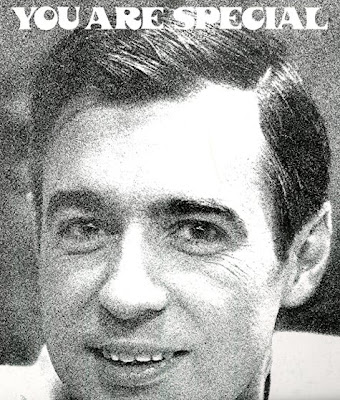"One kind word has a wonderful way of turning into many.” Fred Rogers born March 20th 1929- February 27th 2003

Mister Rogers' Neighborhood began airing in 1968; the last set of new episodes were taped in December 2000, and began airing in August 2001. The show has the distinction of being the longest running program on PBS; it ran for 998 episodes.
Each episode begins the same way, with Mister Rogers walking until he is coming home and singing his theme song, "Won't You Be My Neighbor?" and changing into sneakers and a zippered cardigan sweater.
In an episode, Rogers might have an earnest conversation with his television audience, interact with live guests, take a field trip to a nearby place such as a bakery or music store, or watch a short film.
Typical video subject matter includes demonstrations of how inanimate objects, such as bulldozers and crayons, work or are manufactured.
Each episode includes a trip to Rogers' "Neighborhood of Make-Believe", which features a trolley that has its own chiming theme song, a castle, and the kingdom's citizens, including King Friday XIII. The subjects discussed in the Neighborhood of Make-Believe often allow further development of thematic elements discussed in Mister Rogers' "real" neighborhood.
Mister Rogers often fed his fish during episodes. They were originally named Fennel and Frieda.
Typically, each week's episodes explore a major theme, such as going to school for the first time. Originally, most episodes ended with a song entitled "Tomorrow", while Friday episodes looked forward to the week ahead with an adapted version of "It's Such a Good Feeling." In later seasons, all episodes ended with "Feeling."
Visually, the presentation of the show was very simple; it did not feature the animation or fast pace of other children's shows. Rogers composed all the music for his series. He was concerned with teaching children to love themselves and others. He also tried to address common childhood fears with comforting songs and skits. For example, one of his famous songs explains how you can't be pulled down the bathtub drain—because you won't fit. He even once took a trip to the Children's Hospital of Pittsburgh to show children that a hospital is not a place to fear. During the Gulf War in 1990-91, he assured his audience that all children in the neighborhood would be well cared for, and asked parents to promise to take care of their own children. The message was aired again by PBS during the media storm that preceded the military action against Iraq in 2003.
In February 1990, Rogers' car was stolen while he was taking care of his grandson. The thief apparently realized who the car belonged to after seeing papers and props Rogers had left in the car. The car was returned to Rogers, who found it sitting in front of his home about a day later. The only thing missing from the car was Rogers' director's chair. Rogers' car at the time was an Oldsmobile sedan.
Mister Rogers and PBS funding
In 1969, Rogers appeared before the United States Senate Subcommittee on Communications. His goal was to support funding for PBS and the Corporation for Public Broadcasting, in response to significant proposed cuts. In about six minutes of testimony, Rogers spoke of the need for social and emotional education that public television provided. He passionately argued that alternative television programming like his Neighborhood helped encourage children to become happy and productive citizens, sometimes opposing less positive messages in media and in popular culture. He even recited the lyrics to one of his songs.
The chairman of the subcommittee, John O. Pastore, was not previously familiar with Rogers' work, and was sometimes described as gruff and impatient. However, he reported that the testimony had given him goosebumps, and declared, "I think it's wonderful. Looks like you just earned the $20 million." The subsequent congressional appropriation, for 1971, increased PBS funding from $9 million to $22 million.
"I went into television because I hated it so, and I thought there was some way of using this fabulous instrument to be of nurture to those who would watch and listen."
- Mr.Rogers a hero! (He was red-green colorblind.)
No comments:
Post a Comment